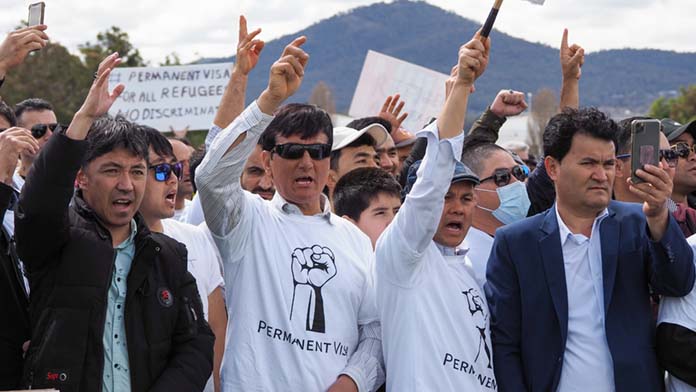A few days before Labor’s national conference, Immigration Minister Andrew Giles announced that Australia’s humanitarian intake would be increased by 2125 places to 20,000.
Although Giles and Anthony Albanese talked up the decision, the announcement was a gesture—a long way from Labor’s long-standing promise of 27,000 places.
The underwhelming announcement set the scene for an equally underwhelming and orchestrated Labor conference.
A general agreement between Labor’s right and left to avoid votes or any critical debate (with a small exception around nuclear submarines) meant the opportunity to put any real internal pressure on the Labor leadership was lost.
The conference re-committed to abolishing Temporary Protection Visas and Safe Haven Enterprise Visas—something that was already Labor policy, but shamefully it has failed to do even after 16 months in power.
Labor also adopted policy to appoint a Special Envoy for Refugee and Asylum Seeker Issues—to do what exactly? Similarly, the call for a Royal Commission was turned into policy to hold a parliamentary inquiry into immigration detention with unspecified terms of reference and unspecified powers.
How many more parliamentary inquiries do we need? Historically parliamentary inquiries are where complaints about abuse in detention go to die.
Perhaps most puzzling is the adoption of the “90 day rule”, which has generally been understood to refer to processing of refugee claims.
Some think this time it might refer to time in detention. Either way, if it came into effect it would make some difference, although there are few boat arrivals these days to benefit from any change. But the length of time in detention is a hideous problem, worse than ever.
Like other aspects of Labor policy, it has been left to the discretion of the parliamentary party to determine when, or if, any of it becomes law.
Labor adopted policy to provide both work and study rights to people while their protection claim is being processed. But the promise does not extend to the refugees brought from PNG and Nauru who are still barred from studying.
In any case, there is no indication of when the policy change will actually come into effect.
An even more glaring omission was that the conference decided nothing about offshore detention, nothing about the refugees still trapped in PNG, and nothing about the 10,000 people seeking asylum who are the victims of the fast track system, left to survive for more than 11 years on bridging visas or no visa at all.
Going into the conference it was Labor policy to abolish the unfair fast track system introduced by the Abbott Liberal government. But Labor has not abolished the fast track system. Worse, Labor is not committed to reviewing the failed cases.
Neil Para’s visa walk
Andrew Giles did review one case in September. Tamil refugee Neil Para and his family were granted permanent visas just as he was about to end his 1000 kilometre walk from Ballarat to Prime Minister Anthony Albanese’s electorate in Marrickville.
Neil and his family have been in Australia seeking asylum since August 2012. There is something very wrong with the refugee processing system when someone has been forced to live in poverty for 11 years—without a visa of any kind, with no work rights, no study rights, no income support, no Medicare—only to be finally granted a permanent visa after a Ministerial review of his case.
Neil’s walk has yet again highlighted the plight of the 10,000 people seeking asylum (including 1500 people still waiting for a decision, 600 people whose claims are being reviewed by the Immigration Assessment Authority and 5000 people who are challenging their refusal in the Federal Court), all forced to survive on limited bridging visas or no visa at all.
Twice since Labor was elected, the Immigration Minister has intervened to grant permanent visas to rejected refugees—the Biloela Tamil family in August 2022, and now Neil Para’s family.
They are the exceptions that prove the rule; that despite occasional political window-dressing Labor remains wedded to the policies of Operation Sovereign Borders.
Just three days after granting Neil a permanent visa, Andrew Giles told ABC radio that “those people who have ultimately been denied refugee status are expected to depart [Australia]”.
To end offshore detention, and win permanent visas for all, the refugee movement will have to fight Labor with protests and demonstrations, as determinedly as it fought Dutton and Morrison.
By Ian Rintoul






